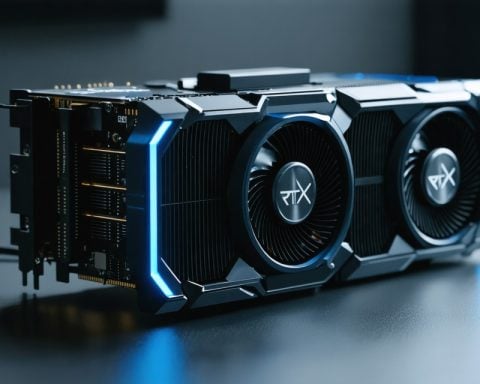In an escalating tech battle, Microsoft has taken the lead in acquiring advanced AI processors, outpacing all its U.S. competitors in 2024. According to estimates provided by Omdia, Microsoft purchased an impressive 485,000 Nvidia Hopper AI processors, a figure that starkly eclipses the numbers procured by other tech giants. Meta Platforms came second with 224,000 units, while Amazon and Google acquired 196,000 and 169,000 chips, respectively.
This surge in acquisitions underscores Microsoft’s commitment to boost its server capabilities, with investments reaching $31 billion, surpassing all other tech counterparts. Notably, Nvidia processors are poised to account for a significant 43% of the anticipated $229 billion injected globally into server technology this year.
However, the race doesn’t stop at Nvidia chips. Major companies are also channeling resources into developing their proprietary AI processors to decrease reliance on a single supplier. Amazon installed a staggering 1.3 million in-house chips, while both Google and Meta allocated 1.5 million units each for their own use in 2024. In contrast, Microsoft’s in-house efforts with 200,000 self-developed Maia chips fall behind its competitors.
Diversification strategies are also evident, as Microsoft placed orders for 96,000 MI300 processors from Advanced Micro Devices, while Meta went further with 173,000 purchases. With the global AI sector projected to expand at an annual rate of 33.2% through 2027, these maneuvers highlight the increasing need for generative AI capabilities.
Microsoft’s AI Processor Lead: What It Means for the Future of Server Technology
In the rapidly evolving landscape of AI technology, Microsoft’s strategic moves in acquiring AI processors have positioned the company at the forefront of the industry. The acquisition of 485,000 Nvidia Hopper AI processors in 2024 not only places Microsoft ahead of its U.S. competitors, but also highlights significant trends and innovations reshaping the future of server capabilities in the tech industry.
Key Trends and Innovations
– Diversification and Reliance Reduction: The heavy investment by Microsoft and other major tech players in Nvidia chips illustrates a broader industry trend towards diversification and reducing dependency on single suppliers. This trend is crucial as companies seek to maintain flexibility and leverage emerging technologies.
– In-house AI Processor Development: Companies like Amazon, Google, and Meta are making substantial progress in developing proprietary AI processors. With Amazon installing 1.3 million in-house chips and Google and Meta both allocating 1.5 million units each, the competition to innovate internally is fierce. This shift underscores the strategic importance of owning proprietary technology to retain competitive advantages.
Microsoft’s Strategic Moves
– AMD Collaboration: Beyond Nvidia, Microsoft’s engagement with Advanced Micro Devices (AMD) through the purchase of 96,000 MI300 processors demonstrates their strategy to diversify technology partners and enhance server capabilities. This collaboration signifies Microsoft’s agility in partnering with key industry players to bolster its technological ecosystem.
– Investment in Generative AI: Microsoft’s investments align with the projected growth in the global AI market. With the industry expected to grow at an annual rate of 33.2% through 2027, these investments not only promise immediate gains in computational power but also position Microsoft to harness future growth in generative AI applications.
Insights Into Industry Dynamics
The strategic acquisitions and development of AI processors by Microsoft’s competitors, such as Meta’s purchase of 173,000 AMD processors and extensive internal development, illustrate the intensifying competition. The industry is witnessing a pivotal transition where companies equip themselves not just to handle current demands, but to innovate for the future of AI technologies.
Challenges and Predictions
– Dependency on AI Technology: Although beneficial, there is a risk of dependency on rapidly evolving AI technology, which can lead to potential vulnerabilities if advancements outpace security measures or operational capabilities.
– Sustainability Concerns: As server capabilities expand, addressing the sustainability of these advancements is imperative. Companies are encouraged to incorporate energy-efficient processes and sustainable practices into their technological growth.
For more insights on how these developments impact the tech industry, visit the main website of Microsoft and AMD for more information.



















